#Jewish Community in Germany
Explore tagged Tumblr posts
Text
Oh this is scathing
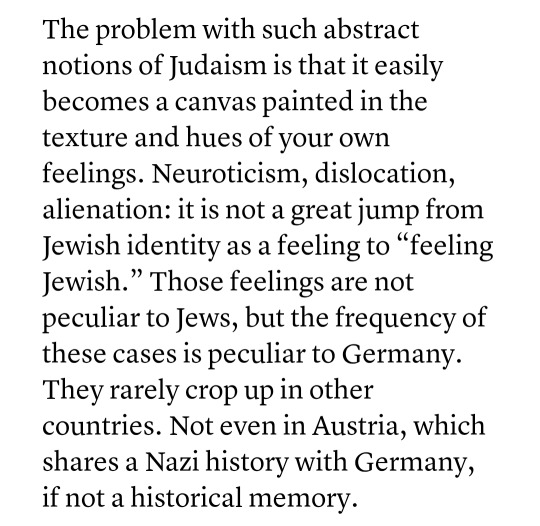
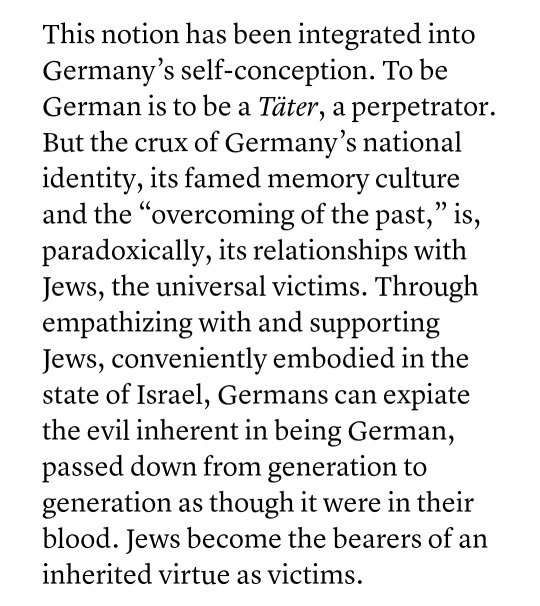
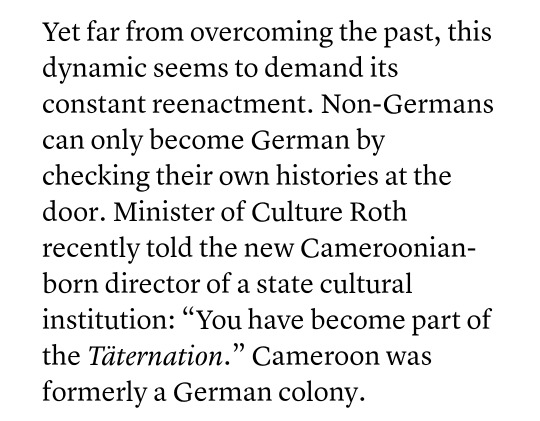
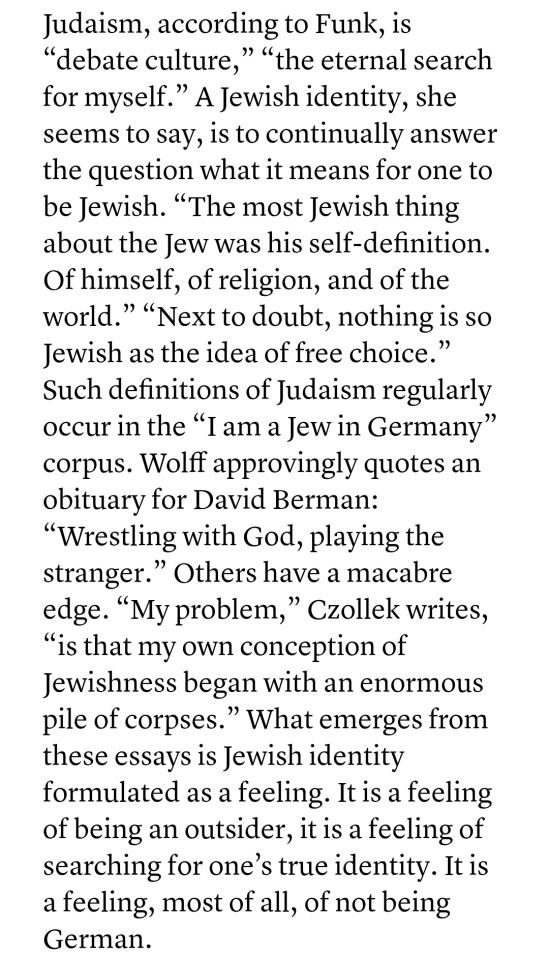
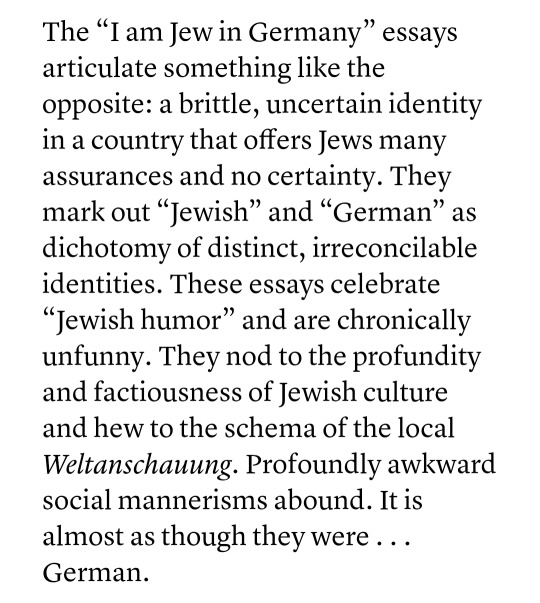
#German memory culture is so fascinating#Also to some extent french#My mother often claimed that we had Jewish ancestry and that a great-grandmother of mine was Jewish#Turns out she'd based that on ''Women talking a weird language'' coming to visit her grandmother#anyway after a whole round of genealogical research we learned that i actually have an Austria-Hungarian great-great-great#grandfather#that is; my great-grandma was talking her mother's home language with cousins that were from three towns over#and they spoke very bad Serbo-Croatian amongst themselves and often just switched to french#but my mother constructed in her mind this whole thing about us being part Jewish and she used to be fascinated by#Woody Allen Roman Polanski Claude Lanzmann the Marx Brothers Jewish humor etc.....#(My mother also spent six months in Germany as a teen during student exchange. i blame them)#But yeah this idea that since i'm neurotic and i had a big nose i was somehow secretly Jewish was drilled into me#She also thought that since my grandpa is Andalusian he probably had some Sephardic blood#Which. What exactly is supposed to be meant here by blood ??? Völk ? Blut ? one-drop rule ??????????#anyway this brand of philosemitism is becoming more and more repulsive to me#Jews are not an enlightened scholar-priest-stand-up-comedian caste with magical blood. They're an imagined community#Same as every other nation; religion; family; culture. Like everybody else they are as good or bad or interesting as imagination allows#And if we have to do weird philo-ism of an outgroup devoid of content let us do what writers have done for 500 years and#Write about talking animals#I'd rather we all collectively hallucinate the houyhnhnms as the quirky fun minority rather than cast real people in that role#or the pigs Napoleon was part of or whatever
22 notes
·
View notes
Text
by Nissan Shtrauchler
Growing security concerns have prompted the Jewish community in Berlin to implement a protective measure: publishing only the first letter of community members’ surnames, rather than their full family names, in birthday announcements in the community newspaper, Bild reported on Friday.
The community’s monthly journal, Jewish Berlin, traditionally includes a “Mazel tov” section for good wishes to those over age 65, as well as to print birth and children’s bar/bat mitzvah celebration announcements.
The publication recently added an explanatory note to the section: “Dear community members, in light of current anti-Israel and antisemitic incidents, we are now printing only birthday and bar/bat mitzvah names with abbreviated surnames as a precautionary security measure.”
Speaking with Bild, Ilan Kiesling, spokesman for the Jewish community in Berlin, explained that this decision was implemented shortly after the Hamas-led massacre in southern Israel on Oct. 7, 2023, stemming from heightened security concerns for community members.
Kiesling emphasized that this precautionary step aims to “minimize the potential for hostile actions against our community members,” citing specific concerns about Hamas supporter demonstrations in Berlin’s streets and the dramatic increase in antisemitic attacks following Oct. 7.
Ahmed Mansour, an expert on radical Islam based in Germany, commented on the community’s decision to withhold full names from public view, telling Bild: “An increasing number of Jews in this country fear being publicly identified as Jewish and subsequently attacked.
“This represents more than just a tragedy—it signifies a fundamental failure. A failure of our political system, our society, and those who claim that ‘never again’ amounts to more than empty rhetoric,” he said.
13 notes
·
View notes
Text
#refugees#churches#germany#protestant churches#catholic churches#jewish communities#asylum seekers#pastor tobias heyden#church asylum#religious freedom
5 notes
·
View notes
Text

7 notes
·
View notes
Text
#refugees#church asylum#religion#germany#protestant churches#catholic churches#jewish communities#asylum seekers#asylum protection#religious freedom
2 notes
·
View notes
Text
Germany's leading Social Democratic Party (SPD) and the opposition Christian Democratic Party (CDU) have ordered high schools in Berlin's borough of Neukolln to distribute brochures titled The Myth of Israel #1948. [...] Neukolln is one of Berlin's most diverse and international boroughs with a large Palestinian community. [...] The brochure states there are five "myths" around the creation of the state of Israel, which are subsequently refuted in short essays by various authors. In the first section, debunking myth #1, that Jews and Arabs lived together in peace before Israel was founded, Israel's pre-state militia, the Haganah, responsible for the destruction of 531 Palestinian villages and the expulsion of 700,000 Palestinians between December 1947 and the summer of 1948, is promoted as a merely "defensive" Jewish resistance movement. Under 'Myth #2: Israel was established on stolen Palestinian land', Masiyot states that the acquisition of land by Jewish immigrants to Palestine took the form of a legal exchange of capital for an official title deed. At no point in history was land illegally conquered by Jewish immigrants, the author of the text, Michael Spaney, claims. Even land conquered following the wars of 1948 and 1967 and the subsequent construction of settlements, which are internationally recognised as a violation of international law, did not occur unlawfully, it says. "Anyone who uses the accusation of land theft as an argument demonises Israel and denies its legitimacy, i.e. acts out of antisemitic motives," Spaney wrote. "Myth #5: Israel is to blame for the Nakba", includes a text by researcher Shany Mor titled "the UN is distorting the meaning of the Nakba: its view of the Israeli-Palestinian conflict is extremely one-sided". In the text, Mor states that "displacement during war - then and now - was nothing unusual". He also labels the UN's attention to the Palestinian cause "obsessive" and the Arab defeat of 1948 a myth.
. . . full article on MME (23 Feb 2024)
4K notes
·
View notes
Text

German police, Zionists and politicians have surrounded a Berlin community centre where pro-Palestine organizers are holding a press conference about the Palestine Congress that is due to begin today.
For weeks, the German media and politicians have been trying to ban the congress.
Organizers homes have been raided, speakers have been threatened with visa bans and the bank account of Jewish organization and co-organizers, Jewish Voice has been shut down.
The slogan of the congress is "We Accuse", and its aim is to highlight Germany's complicity in Israel's genocide in Gaza.
It's speakers include Greek politician Yanis Varoufakis, Irish MP Richard Boyd Barrett and founder of the Palestine Land Society, Dr.Salman Abu Sitta.
2K notes
·
View notes
Text
I’ve been seeing a lot of what I’m going to term “Judenrat Behavior” from American Jewish organizations and individuals over the last week and a half; I am speaking, of course, as a member of the American Jewish community.
The Judenrat were councils of highly respected Jewish individuals the Nazis set up as governing parties in the Jewish ghettos of Poland, Lithuania, and the Western USSR.
They were expected to carry out any and all German orders regarding the Jews, while they simultaneously sought to protect their communities from those orders as much as possible.
Comprised of highly educated, respected men, when the kashariyot (the female functionaries I refer to in my book title as “the girl bandits”) started showing up with evidence of mass murders of Jews in the territories Germany occupied in the summer of 1941, the Judenrat were not having it.
When the male leaders of the organized Jewish youth argued that the evidence needed to be taken seriously, the Judenrat were still not having it. They refused to believe that “this” could happen right in the “middle of Europe,” in the middle of the "civilized world."
Therefore, went the Judenrat's thinking, these young women and men were nothing more than dangerous, hysterical provocateurs. The evidence was right in front of them, and the Jewish Councils refused to accept the reality of the fact that the Germans were carefully, deliberately, and methodically massacring the Jews of Eastern Europe.
We often conflate the Jewish Councils with the Jewish camp guards and ghetto police. I don’t think that’s fair; with the exception of Chaim Rumkowski, the Councils were comprised of individuals who simply couldn’t conceive of This happening in the world they thought they understood.
They weren’t the collaborators the ghettos saw them as. They weren’t putting their parents in deportation trains. They weren’t informing on other Jews. They were just people incapable of, and ultimately, unwilling to see what they were living through for what it was.
Today, we all have the benefit of these histories to learn from. Denying what we see, what we hear, what government officials say won’t get us anywhere, besides maybe dead.
Right now they’re coming for the Latin American and trans communities. And we can’t just all sit back and reenact Martin Niemöller's "First they came for..." We just can't.
446 notes
·
View notes
Text
The Forgotten History of the World’s First Transgender Clinic
I finished the first round of edits on my nonfiction history of trans rights today. It will publish with Norton in 2025, but I decided, because I feel so much of my community is here, to provide a bit of the introduction.
[begin sample]
The Institute for Sexual Sciences had offered safe haven to homosexuals and those we today consider transgender for nearly two decades. It had been built on scientific and humanitarian principles established at the end of the 19th century and which blossomed into the sexology of the early 20th. Founded by Magnus Hirschfeld, a Jewish homosexual, the Institute supported tolerance, feminism, diversity, and science. As a result, it became a chief target for Nazi destruction: “It is our pride,” they declared, to strike a blow against the Institute. As for Magnus Hirschfeld, Hitler would label him the “most dangerous Jew in Germany.”6 It was his face Hitler put on his antisemitic propaganda; his likeness that became a target; his bust committed to the flames on the Opernplatz. You have seen the images. You have watched the towering inferno that roared into the night. The burning of Hirschfeld’s library has been immortalized on film reels and in photographs, representative of the Nazi imperative, symbolic of all they would destroy. Yet few remember what they were burning—or why.
Magnus Hirschfeld had built his Institute on powerful ideas, yet in their infancy: that sex and gender characteristics existed upon a vast spectrum, that people could be born this way, and that, as with any other diversity of nature, these identities should be accepted. He would call them Intermediaries.
Intermediaries carried no stigma and no shame; these sexual and Gender nonconformists had a right to live, a right to thrive. They also had a right to joy. Science would lead the way, but this history unfolds as an interwar thriller—patients and physicians risking their lives to be seen and heard even as Hitler began his rise to power. Many weren’t famous; their lives haven’t been celebrated in fiction or film. Born into a late-nineteenth-century world steeped in the “deep anxieties of men about the shifting work, social roles, and power of men over women,” they came into her own just as sexual science entered the crosshairs of prejudice and hate. The Institute’s own community faced abuse, blackmail, and political machinations; they responded with secret publishing campaigns, leaflet drops, pro-homosexual propaganda, and alignments with rebel factions of Berlin’s literati. They also developed groundbreaking gender affirmation surgeries and the first hormone cocktail for supportive gender therapy.
Nothing like the Institute for Sexual Sciences had ever existed before it opened its doors—and despite a hundred years of progress, there has been nothing like it since. Retrieving this tale has been an exercise in pursuing history at its edges and fringes, in ephemera and letters, in medal texts, in translations. Understanding why it became such a target for hatred tells us everything about our present moment, about a world that has not made peace with difference, that still refuses the light of scientific evidence most especially as it concerns sexual and reproductive rights.
[end sample]
I wanted to add a note here: so many people have come together to make this possible. Like Ralf Dose of the Magnus-Hirschfeld-Gesellschaft (Magnus Hirschfeld Archive), Berlin, and Erin Reed, American journalist and transgender rights activist—Katie Sutton, Heike Bauer. I am also deeply indebted to historian, filmmaker and formative theorist Susan Stryker for her feedback, scholarship, and encouragement all along the way. And Laura Helmuth, editor of Scientific American, whose enthusiasm for a short article helped bring the book into being. So many LGBTQ+ historians, archivists, librarians, and activists made the work possible, that its publication testifies to the power of the queer community and its dedication to preserving and celebrating history. But I ALSO want to mention you, folks here on tumblr who have watched and encouraged and supported over the 18 months it took to write it (among other books and projects). @neil-gaiman has been especially wonderful, and @always-coffee too: thank you.
The support of this community has been important as I’ve faced backlash in other quarters. Thank you, all.
NOTE: they are attempting to rebuild the lost library, and you can help: https://magnus-hirschfeld.de/archivzentrum/archive-center/
#support trans rights#trans history#trans#transgender#trans woman#trans rights#trans representation#interwar period#weimar#equality#autistic author#nonbinary#lgbtq representation#lgbtqia#book news#book#books#new books#thank you#neil gaiman#for your support
2K notes
·
View notes
Text
okay, fine. Yiddish culture.
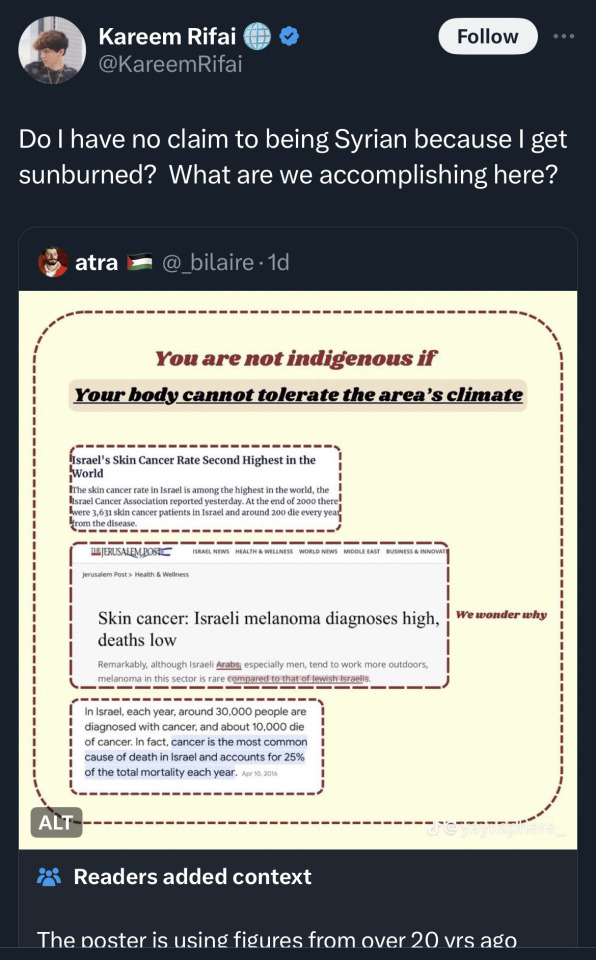
#and like ultimately the us has really flattened a bunch of European Jewish communities under the label Ashkenazi#within the Yiddish- speaking ashki community the label Ashkenazi is much more specific#in large part because western European Jews who now are included in Ashkenazim were outright derogatory towards Yiddish speakers#and would have never considered themselves Ashkenazi in that way because it meant being lumped in with Eastern European yidn#idk if it's differently in Italy but in France and Germany they did not consider themselves part of the same community.#there's no denying that the center of Ashkenazi civilization was in Eastern Europe and revolved around Yiddish#if those people would now like to identify as Ashkenazi that is great and i won't deny them#but historically there were many communities who would resent the association.
3K notes
·
View notes
Text
Magnus Hirschfeld was a gay Jewish man born in Germany in 1868. As one of the founders of the Institut für Sexualwissenschaft, he lived and worked through the rise of Adolf Hitler. A fierce advocate for queer rights and reproductive rights, he is well-remembered in queer history as one of the pillars of the queer community. Using science and knowledge as weapons, he fought for a better world, and, in many ways, shaped the queer community’s current reality.
1K notes
·
View notes
Text
An Islamic subculture has developed in Berlin that glorifies violence and death says Rabbi Dovid Robersts.
The Growing Concern Over Extremism in Berlin’s Islamic Subculture In recent years, the city of Berlin has witnessed the emergence of an Islamic subculture that has raised serious concerns among its residents. Rabbi Dovid Robersts, among many others, has expressed fear and alarm over the glorification of violence and death within this growing community. The events that unfolded in the early…
View On WordPress
0 notes
Text
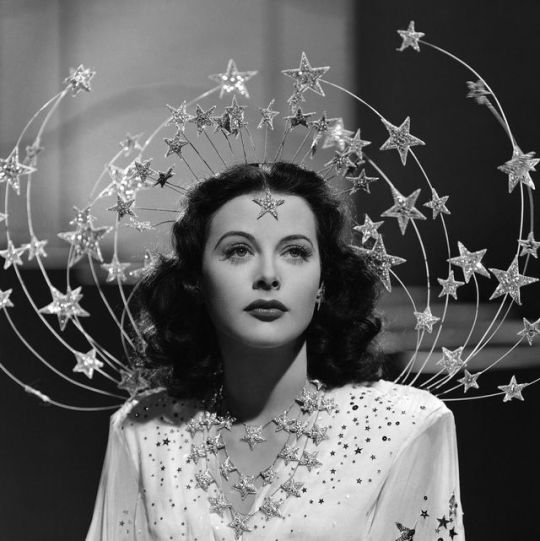

Propaganda
Hedy Lamarr (Samson and Delilah, Ziegfeld Girl)—Look. I'm sure someone has already submitted Hedy Lamarr because she was spectacularly beautiful, and a very strong lady too: she fled both an abusive marriage AND nazi persecution at a very young age and rebuilt a life for herself pursuing her love for acting all on her own!! Her career as an actress was stellar; while she began acting outside of Hollywood (her very first movie, Ecstasy, won a prize at the Venice Film Festival), she conquered American hearts very quickly with her first movie in the US, Algiers, and then just kept getting better and better. If all this isn't enough, she was also an inventor: her invention of the frequency-hopping spread spectrum radio transmission technique forms the base of bluetooth and has a lot of applications in all kinds of communication technologies. I think that deserves a prize, don't you?
Marilyn Monroe (How to Marry a Millionaire, Gentlemen Prefer Blondes, Some Like It Hot)— Ngl I thought you all were lying about sexual attraction until I saw Marilyn Monroe in Gentlemen Prefer Blondes
This is round 6 of the tournament. All other polls in this bracket can be found here. Please reblog with further support of your beloved hot sexy vintage woman.
[additional propaganda submitted under the cut.]
Hedy Lamarr:

The only person you can find both on the Hollywood Walk of Fame and in the Inventor's Hall of Fame--her radio-frequency-hopping technology forms the basis for cordless phones, wi-fi, and a dozen other aspects of modern life. She was also passionate in her efforts to aid the Allies in WWII (unsurprising for a Jewish-Austrian Emigree to America), and her name served as the backbone for one of the best running jokes in what is possibly Mel Brooks' best movie. Look, Louis B. Mayer apparently believed he could plausibly promote her as "The world's most beautiful woman". Is an entire website full of people going to be less audacious than one Louis B. Mayer? I didn't think so!

Described as "Hedy has the most incredible personal sophistication. She knows the peculiarly European art of being womanly; she knows what men want in a beautiful woman, what attracts them, and she forces herself to be these things. She has magnetism with warmth, something that neither Dietrich nor Garbo has managed to achieve" by Howard Sharpe, she managed to escape her controlling husband (and Nazi Germany) by a) Disguising as her maid and fleeing to Paris or b) Convincing the husband to let her wear all of her jewelry to a dinner, only to disappear afterwards. Also she was particularly clever and helped develop Frequency-Hopping Spread Spectrum (I can't really explain it but anyway...)
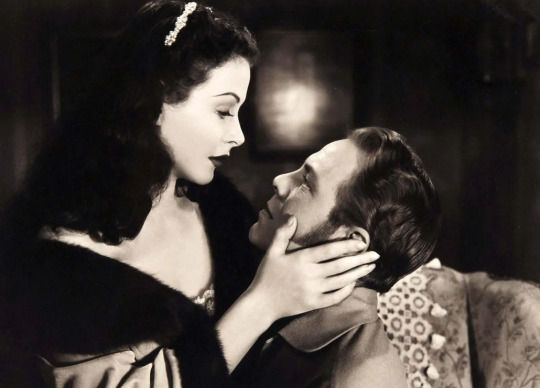
Her depiction of Delilah and Samson and Delilah just lives rent free in my head. The woman was gorgeous.

One of the most beautiful women ever in film, spoken by many critics and fans. Beautiful shapely figure, deeper seductive voice, and often played femme fatale roles. She was also brilliant and an inventor. Mainly self-taught, she invested her spare time, including on set between takes, in designing and drafting inventions, which included an improved traffic stoplight and a tablet that would dissolve in water to create a flavored carbonated drink, and much more.


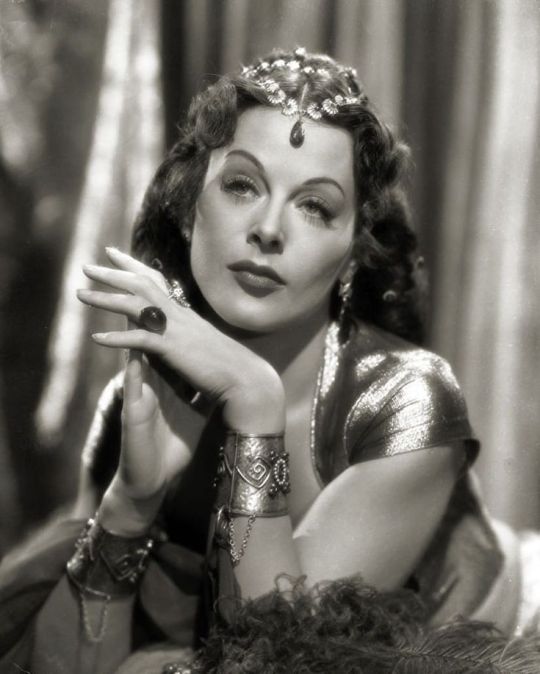
Gorgeous and brilliant pioneer of modern technology and the middle part.

Marilyn Monroe:

She's amazing!!! A classic bombshell, as well as a strong women who overcame so many obstacles. She also advocated for others, like Ella Fitzgerald.

That fucking saxophone that cuts in whenever she appears on screen in Some Like it Hot

I mean, it's Marilyn Monroe. She's adorable. She's gorgeous. She funny. She's the total package

She's the original American sex symbol, an iconic beautiful woman with eyes you could get lost in, legs for days, gorgeous hair, and a cute tummy. Her voice! Just listen to her voice!!!!!
youtube
She is considered one of THE sex symbols of the 1960s and one of the greatest actresses of all time! She HAS to be on this list!

no vintage movie woman is more iconically hot

People are most familiar with pictures of her in the white dress or the Happy Birthday Mr President one, but imo she is at her most beautiful and looks most comfortable when she is photographed by women like Eve Arnold

It’s Marilyn Monroe. If Aphrodite was an actual person, she’d be Marilyn. Do I really need to say more?

What can I say that hasn't been said? Marilyn's legacy is so much bigger than she was in life. She's a defining symbol of 50s and 60s Hollywood sex and it's obvious why. She was absolutely stunning and the camera loved her.

2K notes
·
View notes
Text
During Hitler's first five years in power, the Nazis did a great deal to make the lives of Jews miserable. They revoked their citizenship, ejected Jewish students from German schools, boycotted Jewish stores, and banned Jews from a large number of professions. On occasion, individual Jews were sent to concentration camps; the Nazis, however, had not yet created death camps and, remarkably enough, people were sometimes released from concentration camps and allowed to go home.
On the night of November 9-10, 1938, the Nazis' discriminatory policy toward the Jews changed to wholesale violence as they carried out the largest pogrom in the history of the world. The official pretext for this action was the killing in Paris of a low-level Nazi diplomat by a seventeen-year-old Jewish boy, Herschel Grynspan. The boy's Polish-born parents had been deported several weeks earlier from Germany back to Poland. The Poles, however, refused to accept Grynspan's parents, along with seventeen thousand other Polish-born Jews deported by the Nazis. These unfortunate Jewish refugees were left to rot, penniless, in the no-man's land separating Germany and Poland. Cut off from contact with his parents, Gwynspan shot the German official in retaliation. When the man died, the Nazis decided to punish all of German Jewry for Grynspan's deed.
The pogrom that ensured became known as Kristallnacht, the night of the broken glass. On that night, the glass windows in almost every German synagogue, and in most Jewish-owned businesses, were shattered. Shattered, too, were the lives of almost all German Jews. Ninety-one Jews were murdered during Kristallnacht; thirty thousand more were arrested and sent to concentration camps, where hundreds of them died.
World leaders denounced the Nazi pogrom, and American Jewry reacted by forming the United Jewish Appeal, which soon became the greatest fundraising organization in Jewish history. The Nazis scoffed at the protests. They announced that Kristallnacht had been carried out in honor of the birthday of Martin Luther, the sixteenth century antisemitic religious reformer whom Hitler greatly admired. The Nazis also announced the imposition of a one-billion-mark fine against the Jews; they would be forced to pay for the damage the Germans had inflicted on their synagogues and property.
German Jewry now knew that their situation was hopeless. While large numbers of them had left Germany during the first five years of Nazi rule, half of the community of 600,000 had remained, hoping that Nazi antisemitism would moderate. After Kristallnacht, they recognized that such thinking was illusory; between that event and the outbreak of World War II, less than ten months later, virtually every Jew in Germany tried to emigrate. Few countries, however, were willing to accept them. The British imposed a White Paper in Palestine to ensure that it not become a haven for Jews fleeing Hitler. Some of the Jews who tried to emigrate to the United States succeeded; most did not. In Canada a high government official was asked how many Jewish immigrants the country could accommodate. "None is too many," he answered.
It is no coincidence that Kristallnacht brought about the formation of the United Jewish Appeal, later to become a major financial supporter of Israel. More than any other event of the time, Kristallnacht converted large numbers of Jews into Zionists; the price of not having a Jewish state, they realized, was too, too high.
- Jewish Literacy, Rabbi Joseph Telushkin, pages 390-391
376 notes
·
View notes
Text
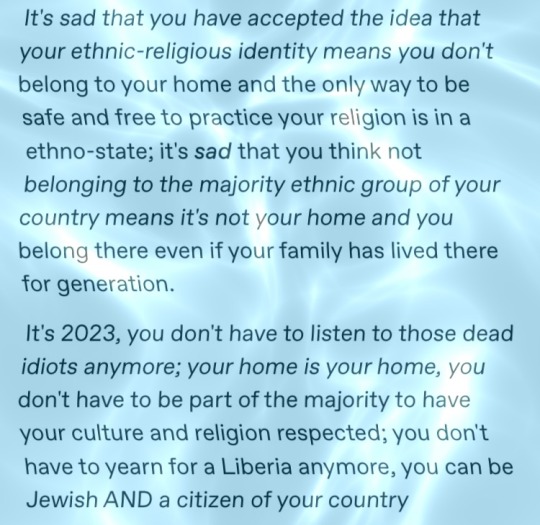
This past Saturday, an antisemitic mob hundreds strong in Russia rioted and shut down an airport. They were trying to find, catch, and murder Jews entering the country. That same day, a Jewish community centre in a different part of Russia was burned down, and "Death to Jews" was painted on the rubble. [1] [14]
On October 9th, protestors in Sydney, Australia chanted "Gas the Jews." [2]
There has been a 300% increase in antisemitic incidents in the UK, including kosher grocery stores being broken into and vandalized, and cars shouting "Kill Jews" at London Synagogues. [3]
Over the past month in Germany: Holocaust memorials have been defaced. The phrase "Jewish pigs" was spray-painted on a Green Party office after a party member spoke out about antisemitism. A teenager at a rally shouted "I want Adolf Hitler back. I’m for Hitler, for gassing the Jews." Molotov cocktails were thrown into synagogues. [3] [4]
On October 21st, Italians shouted, "Open the borders so we can kill the Jews." [5]
In Canada, a Jewish Community Center was egged by a man shouting antisemitic slurs, a Jewish business was, and a local Rabbi had a swastika drawn on his window. [11] [12]
Over the past month, synagogues have been defaced or raided in Austria, Colombia, Chile, France, Portugal and Spain. A historic synagogue was burned down in Tunisia. [6] [7] [8] [9] [10] [13]
All that happened this month, this year. I'm not even touching on the past twenty years of global antisemitism. I'm not even mentioning the United States.
Who told you the proponents of antisemitism and the enemies of Jews were dead? Who told you that our culture and religion were respected in the diaspora? Who told you we could be safely Jewish in “our own countries"? Who lied to you?
2K notes
·
View notes
Text

Jewish wedding ring, Germany, first half of the 14th century
A treasure from the long-lost Jewish communities of Europe, this exquisite and rare gold ring, one of three, was used in Jewish weddings. It takes the form of a miniature building, symbolizing the lost Temple of Jerusalem and has a band in the form of the clasped hands of the betrothed couple. Since Jewish law stipulates that wedding rings be smooth and unadorned, such opulent rings were likely used solely for the ceremony, in which remembrance of the Temple played a vital role.
Metropolitan Museum of Art / Thüringisches Landesamt für Denkmalpflege und Archäologie (object nr. SL.4.2016.59.1)
#yidishkeyt#jewish#jewish history#medieval art#gothic architecture#germany#jewelry#jewellery#jumblr#medieval
519 notes
·
View notes